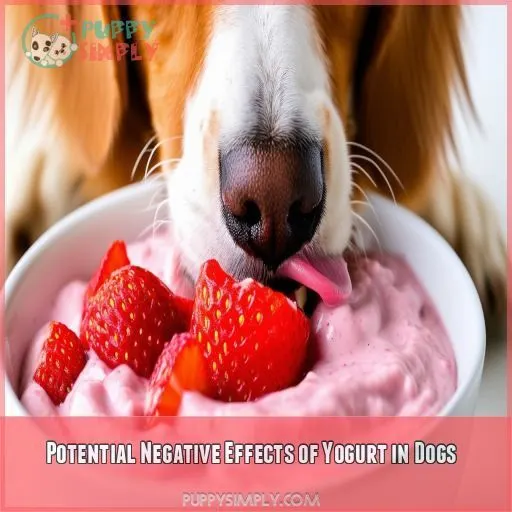This site is supported by our readers. We may earn a commission, at no cost to you, if you purchase through links.
 You are wondering if it’s okay for your furry friend to indulge in some strawberry yogurt? Well, rest assured that you are not the only one, as many dog owners show interest in this yummy treat. While strawberries and plain yogurts are safe for a dog to consume in small amounts, their combination holds some risks.
You are wondering if it’s okay for your furry friend to indulge in some strawberry yogurt? Well, rest assured that you are not the only one, as many dog owners show interest in this yummy treat. While strawberries and plain yogurts are safe for a dog to consume in small amounts, their combination holds some risks.
The following article shall shed light on what to expect regarding the benefits and risks of feeding your dog strawberry yogurt. You will get to know the safe serving size, preparation tips, and precisely how to introduce these foods safely into your pup’s diet.
Learn to handle your dog responsibly while keeping their tail wagging and healthy
Table Of Contents
- Key Takeaways
- Can Dogs Eat Strawberries Yogurt?
- Can Dogs Eat Strawberries?
- How to Feed Strawberries to Dogs
- Benefits of Strawberries for Dogs
- Can Dogs Eat Yogurt?
- How is Yogurt Made?
- Potential Negative Effects of Yogurt in Dogs
- Can Dogs Eat Frozen Yogurt?
- How Much Yogurt Can You Give a Dog?
- Frequently Asked Questions (FAQs)
- Can I give my dog strawberry flavored yogurt?
- Can dogs eat strawberries?
- Can dogs eat yogurt with fruit?
- What kind of yogurt can dogs eat?
- Can dogs eat strawberry yogurt?
- Can eating strawberries be bad for you?
- Can dogs eat canned strawberries?
- Are strawberries good for dogs?
- Can strawberry yogurt help with a dogs bad breath?
- Is homemade strawberry yogurt safer for dogs than store-bought?
- How does strawberry yogurt affect a dogs coat condition?
- Can diabetic dogs safely eat strawberry yogurt as a treat?
- Are there any breed-specific considerations for feeding strawberry yogurt?
- Conclusion
Key Takeaways
- While strawberries are a paw-some treat for pups, mixing them with yogurt can be a bit of a sticky situation. Plain yogurt’s usually fine, but those fruity flavored varieties often have more sugar than a kid in a candy store!
- Moderation is the name of the game here, folks. Think of strawberry yogurt like that extra slice of pizza – tempting, but too much might leave your furry friend feeling ruff. A spoonful for a big dog or a lick for a little one should do the trick.
- Keep your eyes peeled for any tummy troubles after introducing this treat. Some dogs have lactose issues that’ll make them dodge dairy faster than a cat avoiding bath time. Start small and see how it goes.
- Why not whip up a homemade frozen yogurt treat instead? Blend some plain yogurt with fresh strawberries, freeze it, and voilà! You’ve got a cool snack that’ll have your pup doing the happy dance on hot summer days
Can Dogs Eat Strawberries Yogurt?
Yes, dogs can eat strawberries and yogurt, but moderation is key. Strawberries are packed with vitamins and antioxidants, offering benefits like immune support and dental health. When feeding strawberries to your pup, wash them thoroughly and remove the stem.
As for yogurt, stick to plain varieties without artificial sweeteners or xylitol. Greek yogurt is a good choice due to its lower lactose content and probiotic benefits. However, many dogs are lactose intolerant, so introduce yogurt gradually and watch for digestive issues.
You can even blend strawberries into plain yogurt for a tasty, cooling treat. But before you start serving up this fruity delight, there’s more you should know
Can Dogs Eat Strawberries?
Dogs can safely eat strawberries, which are rich in vitamins, minerals, and antioxidants. However, always wash and prepare them properly, and monitor your dog’s intake to avoid stomach upset from their high sugar content
Nutritional Benefits
If you’re considering strawberries for your dog, the nutritional perks are worth noting. They provide vitamins, minerals, and antioxidants that aid in:
- Supporting the immune system and cognitive function.
- Enhancing dental health due to their malic acid content.
- Promoting joint support thanks to their anti-inflammatory properties.
Just remember, moderation is key due to their sugar content
Safety Precautions
Wash and core the strawberries with the tops off before offering them to your dog. Ensure that the size of the cut strawberries is appropriate for the size of your dog, as you wouldn’t want him to choke.
Introduce the strawberries in small amounts at a time and observe for strawberry allergies or stomach upset.
Avoid products containing xylitol or artificial sweeteners, as these are toxic to dogs
How to Feed Strawberries to Dogs
To safely feed strawberries to your dog, wash them thoroughly, remove the core, and cut off the tops. Serve whole strawberries to large dogs or cut into bite-sized pieces for smaller breeds, and consider pureeing or freezing them for a tasty treat
Preparation
Before serving strawberries to your dog, you’ve got to prepare them correctly:
- Wash thoroughly to remove any pesticides or dirt.
- Remove the core and cut off the tops.
- Serve whole strawberries for large dogs or cut into bite-sized pieces for smaller breeds.
- For a fun treat, puree or freeze them to make it more enjoyable for your pup
Serving Sizes
For serving sizes, stick to these guidelines based on your dog’s size: small dogs can have 1 strawberry, medium dogs up to 4, and large dogs up to 5. Blend strawberries into plain, unsweetened yogurt for a tasty treat. Be mindful of added sugars in fruit yogurt, and avoid canned strawberries or vanilla yogurt with artificial ingredients
Benefits of Strawberries for Dogs
Strawberries are packed with essential nutrients like magnesium, potassium, and vitamin C, which support your dog’s overall health. Their antioxidants help bolster the immune system and can even promote heart and joint health
Vitamins and Minerals
Strawberries are packed with essential vitamins and minerals** that can benefit your pup’s health. They’re rich in magnesium, potassium, manganese, and folic acid – all of which support your dog’s immune system, heart, eyes, and joints. Plus, the malic acid in strawberries can even help whiten their teeth!
Antioxidants
Strawberries are packed with antioxidants like vitamin C and polyphenols, providing essential antioxidant protection to your dog’s immune system and overall health. These antioxidant properties combat aging effects and support healthier skin and fur.
| Antioxidant Source | Benefit |
|---|---|
| Vitamin C | Immune support |
| Polyphenols | Anti-aging |
| Malic Acid | Teeth whitening |
Health Support
Strawberries support your dog’s health with magnesium, potassium, manganese, and folic acid. Rich in antioxidants like vitamin C and polyphenols, they strengthen the immune system, aid heart, eye, and joint health, and can even help whiten teeth thanks to malic acid. However, always consider the high sugar content and potential digestive upset from strawberry yogurt
Can Dogs Eat Yogurt?
Dogs can eat yogurt, but you need to check for toxic ingredients like artificial sweeteners, particularly xylitol. Be aware that most dogs are lactose intolerant, so introduce yogurt gradually and monitor for any digestive issues
Check for Toxic Ingredients
Before feeding your doggie strawberries and yogurt, always look out for the ingredients that could be toxic. After all, some yogurts can contain xylitol, another form of artificial sweeteners, or other hazardous ingredients. Here is how to ensure safety:
- Check the ingredient list: Avoid unhealthy additives as much as possible.
- Stick to plain yogurt: Flavored types are loaded with sugars.
- Labels: Look for "no artificial ingredients.".
Lactose Intolerance
Dogs are mostly lactose intolerant, so start with tiny yogurt amounts. Monitor for symptoms like gas, diarrhea, or upset stomach. Greek yogurt is recommended due to lower lactose levels, benefiting digestion with probiotics.
| Issue | Symptoms | Recommended Option | Benefits |
|---|---|---|---|
| Lactose Intolerance | Gas, diarrhea | Greek yogurt | Lower lactose |
| Digestive Health | Stomach upset | Greek yogurt | Probiotics aid |
| Monitoring | Watch symptoms | Start small | Assess tolerance |
How is Yogurt Made?
Yogurt starts with milk that’s heated and cooled before adding bacteria to ferment it. The fermentation process creates different types of yogurt, like Greek and regular, which vary in lactose and protein content
Fermentation Process
Yogurt is made through fermentation, creating a delicious, nutritious treat. Here’s how it’s done:
- Starter Culture: Add lactic acid bacteria to milk.
- Temperature Control: Heat milk to around 110°F.
- Incubation Time: Keep this temperature for 4-12 hours.
- Probiotics: These beneficial bacteria ferment the milk, transforming it into yogurt, rich in health benefits
Types of Yogurt
Yogurt is made by a fermentation process in which live cultures turn milk into creamy snacks. They range from Greek yogurt, lower in lactose and high in protein, to soy yogurt for dogs intolerant to lactose. These live cultures can be pretty helpful in your dog’s digestion, but always use plain and unsweetened ones for safety measures.
Potential Negative Effects of Yogurt in Dogs
Feeding your dog yogurt can sometimes cause digestive issues, especially if they’re lactose intolerant or the yogurt contains artificial sweeteners like xylitol, which are toxic. Be cautious with flavored yogurts that may have added sugars or other harmful ingredients
Digestive Issues
Yogurt can cause digestive issues in dogs, especially if they’re lactose intolerant. The fermentation process of yogurt reduces lactose, but it’s still present. Probiotics in yogurt help with digestion, but not all dogs tolerate them well. Calcium can benefit your dog, but always start with small amounts and monitor for any signs of stomach upset
Artificial Sweeteners
Artificial sweeteners in yogurt can be toxic to dogs. One especially dangerous ingredient is xylitol, which can cause a rapid insulin release, leading to hypoglycemia. Always check yogurt labels for artificial sweeteners before feeding it to your dog. Even small amounts can be harmful, so it’s best to avoid sweetened yogurts altogether for your dog’s health
Can Dogs Eat Frozen Yogurt?
Yes, dogs can eat frozen yogurt, provided it contains no harmful ingredients like xylitol. Add some dog-safe fruits, and you have a lovely refreshment with nutritional value during hot weather.
Cooling Treats
Fido will love cooling off with a refreshing frozen yogurt treat this summer. Just blend plain, unsweetened yogurt and freeze. For added flavor and extra nutritional value, mix some fruits like strawberries or blueberries, which are safe for your dog to consume. These healthy frozen treats help in beating the heat while furnishing wholesome vitamins and minerals throughout.
Adding Dog-Safe Fruit
Frozen yogurt is a fantastic summer treat for your pup. This includes only dog-friendly fruits like strawberries or blueberries.
Frozen yogurt has a cooling effect and provides additional digestion aids because of the probiotics in the yogurt that help to beat the heat.
Begin with small servings and watch for lactose intolerance.
Homemade frozen yogurt-based treats set up a healthy method to refresh your furry companions
How Much Yogurt Can You Give a Dog?
When feeding yogurt to your dogs, it shouldn’t compose more than 10 percent of their daily caloric intake. Observe your dog’s gastrointestinal health and look for stomach upset or intolerance symptoms, especially during the first days when you introduce the yogurt to their diet.
Daily Calorie Limit
A good rule of thumb in portioning would be to keep the yogurt ratio to about 10% of their daily intake of calories. For example, this might mean a teaspoon for tiny breeds but a tablespoon or two for larger dogs.
And as much as your pup might love this yummy treat, remember to offer yogurt in moderation—not as part of their regular everyday diet.
Be sure to consult your vet for specific recommendations, especially if your pup has allergies or is prone to digestive upset
Monitoring Digestive Health
When introducing yogurt to your dog’s diet, keep a close eye on their digestive health. Start with small amounts and gradually increase, monitoring for any changes. Pay attention to:
- Stool consistency
- Probiotic intake effects
- Electrolyte balance
- Digestive enzyme activity
If you notice any issues, adjust the serving size or consider alternative dietary supplements. Remember, every dog is unique, so what works for one may not work for another. Your pup’s well-being is the top priority!
Frequently Asked Questions (FAQs)
Can I give my dog strawberry flavored yogurt?
Did you know 80% of dogs are lactose intolerant? You shouldn’t give your dog strawberry-flavored yogurt. It’s often high in sugar and may contain artificial sweeteners. Stick to plain, unsweetened yogurt as an occasional treat instead
Can dogs eat strawberries?
Yes, dogs can eat strawberries safely. They’re packed with nutrients and antioxidants that support your pup’s health. Just wash them, remove the stems, and cut into bite-sized pieces. Remember to offer in moderation as a tasty, occasional treat
Can dogs eat yogurt with fruit?
Picture your pup’s eyes lighting up as you offer a spoonful of fruity yogurt. You can safely share plain yogurt with dog-friendly fruits like strawberries. It’s a tasty treat, but remember to keep portions small and avoid added sugars
What kind of yogurt can dogs eat?
You can feed your dog plain, unsweetened yogurt. Greek yogurt‘s a great choice as it’s lower in lactose and higher in protein. Avoid flavored varieties with added sugars or artificial sweeteners. Always introduce new foods gradually to monitor for any reactions
Can dogs eat strawberry yogurt?
You shouldn’t feed your dog strawberry yogurt. It often contains added sugars and artificial sweeteners that can be harmful. Stick to plain, unsweetened yogurt instead. If you want to add flavor, mix in fresh strawberries yourself
Can eating strawberries be bad for you?
Did you know strawberries are 91% water? They’re generally safe to eat, but you might experience allergic reactions or digestive issues if you’re sensitive. Moderation’s key – don’t overdo it, and you’ll reap their nutritional benefits
Can dogs eat canned strawberries?
You shouldn’t feed your dog canned strawberries. They’re often packed in syrup, which is too sugary for dogs. If you must, choose ones in water without additives. Fresh strawberries are a much better option for your pup
Are strawberries good for dogs?
Yes, strawberries are good for dogs. They’re packed with vitamins, minerals, and antioxidants that support your pup’s immune system, heart, and joints. They can even help whiten teeth! Just remember to feed them in moderation
Can strawberry yogurt help with a dogs bad breath?
While strawberry yogurt might freshen your dog’s breath temporarily, it’s not a long-term solution. The sugar content can actually worsen dental issues. For better breath, try dental chews or regular teeth brushing instead
Is homemade strawberry yogurt safer for dogs than store-bought?
Homemade strawberry yogurt can be safer for your dog, as you control the ingredients. You’ll avoid artificial sweeteners and excess sugar. However, store-bought plain yogurt with fresh strawberries is equally safe and more convenient for most pet owners
How does strawberry yogurt affect a dogs coat condition?
You’ll notice your dog’s coat may become shinier and healthier with strawberry yogurt. The probiotics support skin health, while vitamins and antioxidants nourish hair follicles. However, moderation is key to avoid digestive issues from excess dairy
Can diabetic dogs safely eat strawberry yogurt as a treat?
Picture a diabetic pup eyeing a creamy treat. You shouldn’t give your diabetic dog strawberry yogurt. It’s high in sugar, which can spike blood glucose levels. Stick to vet-approved, low-sugar treats to keep your furry friend healthy
Are there any breed-specific considerations for feeding strawberry yogurt?
While breed-specific considerations aren’t major, smaller dogs need less yogurt to avoid weight gain. Giant breeds may tolerate more lactose. Always introduce strawberry yogurt slowly, watching for digestive issues regardless of breed. Moderation’s key for all dogs
Conclusion
Feeding your dog strawberry yogurt is much like a balancing act with nutrition. By themselves, both strawberries and plain yogurt are safe for treats so long as no other ingredients are toxic and there isn’t any lactose intolerance.
You’ll want to prepare and serve appropriate portions while observing your pup’s digestive health. Remember, can dogs eat strawberry yogurt? Yes, but in moderation.
Follow these tips in this article to safely include this treat in your dog’s diet while it gainfully reaps possible health benefits














